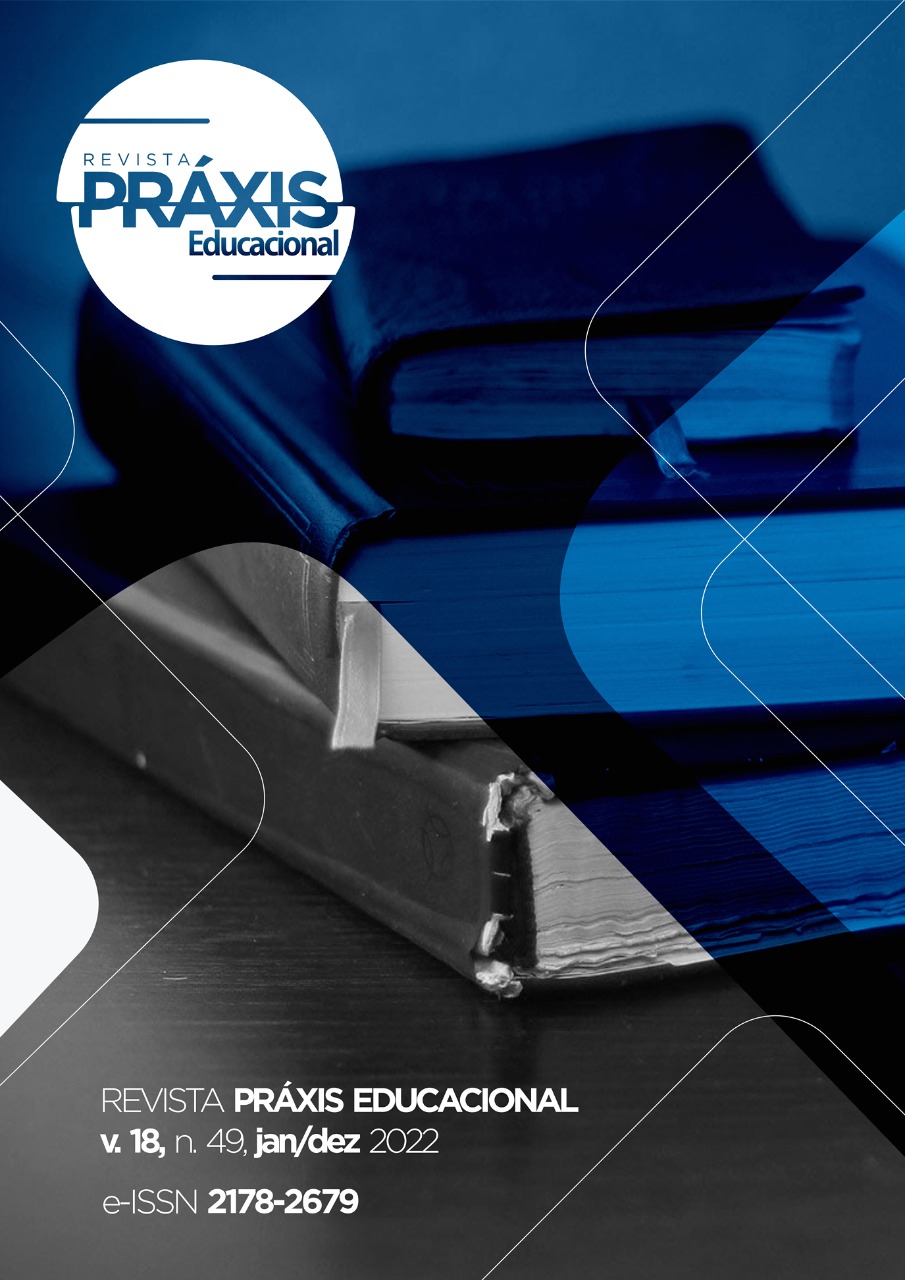Leitura crítica de memes da internet em aulas de língua inglesa
DOI:
https://doi.org/10.22481/praxisedu.v18i49.11095Palavras-chave:
leitura crítica, linguagem, memes da internetResumo
Memes podem ser definidos como pequenas unidades de sentido transmitidas e transformadas de pessoa para pessoa em processos de cópia e imitação (DÍAZ, 2013; DAWKINS, 1976). Com o passar do tempo, as teorias sobre memes foram revisitadas devido a questões contemporâneas envolvendo tecnologias na sociedade (SHIFMAN, 2014). Com base nesses aspectos, apresentamos e analisamos uma pesquisa documental (LAVILLE; DIONNE, 1999; FLICK, 2009) caracterizada pelo levantamento de memes da Internet e uma proposta de sequência didática no contexto de aulas de língua inglesa. As análises foram fundamentadas na perspectiva da leitura crítica e da justiça social (JORDÃO, 2017). Como resultado, apontamos os memes como recursos potencializadores para o estabelecimento da crítica social em sala de aula, uma vez que eles podem retratar realidades diversas.
Downloads
Metrics
Referências
BOA SORTE, Paulo; VICENTINI, Cristiane. Educating for social justice in a post-digital era. Práxis Educacional, [S. l.], v. 16, n. 39, p. 199-216, 2020.
BURWELL, Catherine. The Routledge Companion to media education, copyright, and fair use. USA: Routledge, 2018.
CETIC-BR. Tic Domicílios 2019: principais resultados. São Paulo: Comitê Gestor da Internet no Brasil, 2020a – Disponível em: https://cetic.br/media/analises/tic_domicilios_2019_coletiva_imprensa.pdf. Acesso em: 20 jan. 2022.
CETIC-BR. Tic Educação 2019: coletiva de imprensa. São Paulo: Comitê Gestor da Internet no Brasil, 2020b – Disponível em: https://www.cetic.br/media/analises/tic_educacao_2019_coletiva_imprensa.pdf. Acesso em: 20 jan. 2022.
COLLINS, Patricia Hill; BILGE, Sirma. Intersectionality. Malden: Polity Press, 2016.
DAWKINS, Richard. The selfish gene. Londres: Oxford University Press, 1976.
DENARDI, Didiê Ana Ceni. Didactic sequence: a dialectic mechanism for language teaching and learning. Revista Brasileira de Linguística Aplicada. Belo Horizonte, v. 17, n. 1, p. 163-184, mar. 2017.
DÍAZ, Carlos Mauricio. Defining and characterizing the concept of Internet Meme. Revista CES Psicología, v. 2, 82-104, 2013.
DONGQIANG, Xie; SERIO, Ludovico de; MALAKHOV, Alexander; MATYS, Olga. Memes and Education: opportunities, approaches and perspectives. Geopolitical, Social Security and Freedom Journal, v. 3, n. 2, 2020.
FLICK, Uwe. Introdução à pesquisa qualitativa. Porto Alegre: Artmed, 2009.
GLĂVEANU, Vlad Petre; SAINT-LAURENT, Constance; LITERAT, Ioana. Making sense of refugees online: Perspective taking, political imagination, and Internet memes. American Behavioral Scientist, v. 62, n. 4, p. 440-457, 2018.
HARTMAN, Pamela; BERG, Jessica; FULTON, Hannah; SCHULER, Brandon. Memes as Means: using popular culture to enhance the study of Literature. The Journal of the Assembly for Expanded Perspectives on Learning, v. 26, p. 65-82, 2021.
JENKINS, Henry. Cultura da convergência. Tradução de Susana Alexandria. São Paulo: Aleph, 2009.
JORDÃO, Clarissa Menezes. Birds of different feathers: algumas diferenças entre letramento crítico, pedagogia crítica e abordagem comunicativa. In: TAKAKI, Nara Hiroko; MACIEL, Ruberval Franco (org.). Letramentos em terra de Paulo Freire. Campinas, SP: Pontes, 2017.
JORDÃO, Clarissa Menezes.; FIGUEIREDO, Eduardo Henrique Diniz de; MARTINEZ, Juliana Zeggio. Trapacear a linguística aplicada com Pennycook e Makoni: transglobalizando norte e sul. Trabalhos em Linguística Aplicada, Campinas, SP, v. 59, n. 1, p. 834–843, 2020.
KALANTZIS, Mary; COPE, Bill. Adding sense: context and interest in a grammar of multimodal meaning. New York: Cambridge University Press, 2020.
KAYALI, Nurda Karadeniz; ALTUNTAS, Ash. Using memes in language classroom. Shanlax International Journal of Education, v. 9, n. 3, p. 155-160, 2021.
KNOBEL, Michele; LANKSHEAR, Colin. Online memes, affinities, and cultural production. In: KNOBEL, Michele; LANKSHEAR, Colin (org.). A New Literacies Sampler. New York: Peter Lang Publishing, 2007, p. 199-227.
LAVILLE, Christian; DIONNE, Jean. A construção do saber: manual de metodologia da pesquisa em ciências humanas. Tradução de Heloísa Monteiro e Francisco Settineri. Porto Alegre: Artmed, 1999.
LUKE, Allan. Critical literacy: Foundational notes. Theory into practice, v. 51, n. 1, p. 4-11, 2012.
MATIAS, Keno Ivan. Integration of internet memes in teaching social studies and its relation to the development of critical thinking skills: a literature review. Global Scientific Journals, v. 8, n. 2, dez. 2020.
MENEZES DE SOUZA, Lynn Mário Trindade. Glocal languages, coloniality and globalization from below. In: GUILHERME, Manuela; MENEZES DE SOUZA, Lynn Mário Trindade (org.). Glocal languages and critical intercultural awareness: The south answers back. New York: Routledge, 2019, p. 17-41.
MENEZES DE SOUZA, Lynn Mário Trindade; MONTE MÓR, Walkyria. Still Critique? Revista Brasileira de Linguística Aplicada, v. 18, n. 2, p. 445-450, 2018.
POLLOCK, Tom. The difference between structured, unstructured and semi-structured interviews (2019). Disponível em: https://www.oliverparks.com/blog-news/the-difference-between-structured-unstructured-amp-semi-structured-interviews. Acesso em: 25 jan. 2022.
REDDY, Rishabh; SINGH, Rishabh; KAPOOR, Vidhi; CHURI, Prathamesh. Joy of learning through internet memes. International Journal of Engineering Pedagogy, v. 10, n. 5, p. 116-133, 2020.
REIS, Sônia Maria Alves de Oliveira. Paulo Freire: 100 anos de práxis libertadora. Práxis Educacional, [S. l.], v. 17, n. 47, p. 238-258, 2021.
ROMERO, Mary. Introducing Intersectionality. Malden: Polity Press, 2018.
SHIFMAN, Limor. Memes in digital culture. USA: The MIT Press, 2014.
SILVA, Nayara Stefanie Mandarino; NUNES, Thainná Melo. Memes na formação inicial de professores de inglês. EntrePalavras, Fortaleza, v. 11, n. 1, p. 1-23, jan./abril 2021.
Downloads
Publicado
Como Citar
Edição
Seção
Licença
Copyright (c) 2022 Práxis Educacional

Este trabalho está licenciado sob uma licença Creative Commons Attribution-ShareAlike 4.0 International License.
Você é livre para:
Compartilhar - copia e redistribui o material em qualquer meio ou formato; Adapte - remixe, transforme e construa a partir do material para qualquer propósito, mesmo comercialmente. Esta licença é aceitável para Obras Culturais Livres. O licenciante não pode revogar essas liberdades, desde que você siga os termos da licença.
Sob os seguintes termos:
Atribuição - você deve dar o crédito apropriado, fornecer um link para a licença e indicar se alguma alteração foi feita. Você pode fazer isso de qualquer maneira razoável, mas não de uma forma que sugira que você ou seu uso seja aprovado pelo licenciante.
Não há restrições adicionais - Você não pode aplicar termos legais ou medidas tecnológicas que restrinjam legalmente outros para fazer qualquer uso permitido pela licença.










